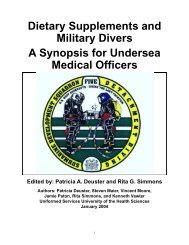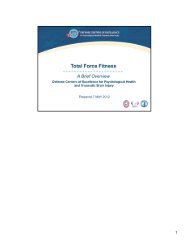Force Health Protection: Nutrition and Exercise Resource Manual
Force Health Protection: Nutrition and Exercise Resource Manual
Force Health Protection: Nutrition and Exercise Resource Manual
Create successful ePaper yourself
Turn your PDF publications into a flip-book with our unique Google optimized e-Paper software.
General <strong>Nutrition</strong> Issues<br />
Maintaining or improving health <strong>and</strong> fitness is more challenging in<br />
adverse conditions such as extreme heat, cold, or altitudes. Even highly,<br />
physically fit individuals can be quickly overcome by “environmental<br />
exposure” if proper preparation is overlooked or if symptoms of impending<br />
illness are ignored. The adaptation of the body to adverse environments<br />
increases energy expenditure <strong>and</strong> water losses. Furthermore, dehydration<br />
results in a loss of appetite. If energy <strong>and</strong> fluid needs are not met, then<br />
performance will be impaired. General suggestions for meeting increased<br />
energy <strong>and</strong> fluid requirements are provided below. Issues relevant to a<br />
particular environment are provided later.<br />
Maintaining Energy Balance<br />
◆ Eat a high-CHO diet to meet increased kcal needs,<br />
as CHO are more readily absorbed <strong>and</strong> better<br />
tolerated than fats or proteins.<br />
◆ Avoid fatty foods which may not be well tolerated.<br />
◆ Avoid high-protein intakes which will increase water loss <strong>and</strong> can<br />
lead to dehydration. (See Chapter 2 page 9.)<br />
◆ Eat small frequent meals.<br />
◆ When eating field rations, eat the entrees as well as the other<br />
food <strong>and</strong> beverage items provided in the pack.<br />
◆ Drink a high-CHO beverage to increase your kcal intake if you<br />
are having difficulty eating enough solid foods to meet your<br />
energy needs.<br />
Maintaining Fluid Balance<br />
Maintaining fluid balance is crucial to avoid dehydration, as stated<br />
in Chapter 2 on page 17. Dehydration can limit performance <strong>and</strong><br />
severe dehydration can be life-threatening. Tips for maintaining fluid<br />
balance include:<br />
◆ Monitor hydration status by the frequency <strong>and</strong> color of your<br />
urine. Infrequent <strong>and</strong> dark yellow urine suggests dehydration.<br />
◆ When possible, monitor fluid status by weighing yourself prior to<br />
<strong>and</strong> after prolonged physical activities. For every pound of weight<br />
lost due to water losses, drink 2 cups (0.45 L or 16 oz.) of water.<br />
<strong>Nutrition</strong> <strong>and</strong> <strong>Exercise</strong> <strong>Resource</strong> <strong>Manual</strong> 93




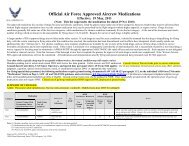
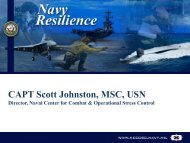
![Body Composition and Military [PDF] - Human Performance ...](https://img.yumpu.com/43269347/1/190x245/body-composition-and-military-pdf-human-performance-.jpg?quality=85)
![Tips for Grocery Shopping [PDF]](https://img.yumpu.com/37447379/1/190x245/tips-for-grocery-shopping-pdf.jpg?quality=85)
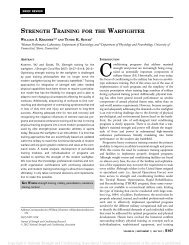
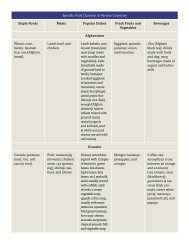
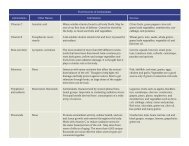
![Synthetic Drugs [PDF] - Human Performance Resource Center](https://img.yumpu.com/37447322/1/190x245/synthetic-drugs-pdf-human-performance-resource-center.jpg?quality=85)
